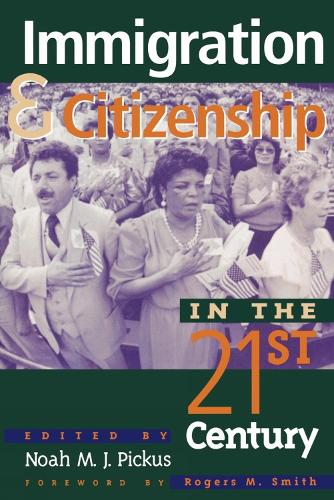
Immigration and Citizenship in the Twenty-First Century
(Paperback)
Publishing Details
Immigration and Citizenship in the Twenty-First Century
By (Author) Noah M. J. Pickus
Foreword by Rogers M. Smith
Contributions by Kwame Anthony Appiah
Contributions by Linda S. Bosniak
Contributions by Joseph H. Carens
Contributions by David A. Hollinger
Contributions by Michael Jones-Correa
Contributions by Charles R. Kesler
Contributions by John J. Miller
Contributions by Hiroshi Motomura
Bloomsbury Publishing PLC
Rowman & Littlefield Publishers
20th August 1998
United States
Classifications
Tertiary Education
Non Fiction
Civics and citizenship
Political science and theory
325.73
Physical Properties
Paperback
272
Width 150mm, Height 229mm, Spine 21mm
395g
Description
In this important book, a distinguished group of historians, political scientists, and legal experts explore three related issues: the Immigration and Naturalization Service's historic review of its citizenship evaluation, recent proposals to alter the oath of allegiance and the laws governing dual citizenship, and the changing rights and responsibilities of citizens and resident aliens in the United States. How Americans address these issues, the contributors argue, will shape broader debates about multiculturalism, civic virtue and national identity. The response will also determine how many immigrants become citizens and under what conditions, what these new citizens learn_and teach_about the meaning of American citizenship, and whether Americans regard newcomers as intruders or as fellow citizens with whom they share a common fate.
Reviews
There may be no greater or more important gulf in contemporary America than that between the academy and the public over questions of immigration and citizenship. This collection of essays comes closer than any I have seen to exploring these contentious questions with honesty and rigor. As we face anew what it means to be an American, Noah Pickus has performed a vital service. -- Peter Skerry, Brookings Institution and Claremont McKenna College
This collection of essays has two great merits: First is the sheer importance of its subject: the meaning of American citizenship is obviously at the heart of many current controversies within our policy. Second is the quality of the essays. This is a wonderful introduction to the array of opinions on the issue. It should prove helpful to scholars and citizens alike. -- Sanford Levinson, University of Texas at Austin
Throughout our existence as a nation, the process of becoming an American citizen has been linked to disputes over what it means to be an American. Combining history, theory, law, and public policy, these essays by a diverse group of first-rate scholars offer a terrific introduction to this subject. Their debates illuminate the basic issues that a 21st century immigration and naturalization policy will have to address. -- William A. Galston, Senior Fellow, The Brookings Institution
...offers a diversity of well-argued perspectives on the contemporary American debate over citizenship. -- Peter Andreas, Harvard University * Political Science Quarterly *
Although the book contains many useful reflections on the 1997 report of the Commision on Immigration Reform, most of the pieces extend well beyond it to broader considerations of the contemporary meaning of citizenship in the United States. The volume's major contribution is to provide a theoretical background for the general themes of U.S. immigration law and policy. The selections are high quality and the book holds together as a whole. The combination of longer essays and shorter responses would work well in any upper-division or graduate class which treats the topic of immigration at length, and many of the contributions counter the prevailing wisdom, which may spark energetic classroom conversation. For those wishing to enter into the current conversation, this volume is a better starting place than most. -- Daniel Levin, Department of Political Science, Boise State University * Journal of Law & Politics *
One of the most difficult issues we will be dealing with in the next decade is the nature of citizenship in the United States. What do we expect, what do we demand, what do we have the right to expect or demand, of the one million new citizens a year we are now adding to the American polity What can national loyalty mean in a world of changing nation-states, ever more closely bound together The papers in this volume form an excellent introduction to these complex issues: They underline the implications of our current law of citizenship, and the alternatives that are being proposed. -- Nathan Glazer, Harvard University
Although the book contains many useful reflections on the 1997 report of the Commision on Immigration Reform, most of the pieces extend well beyond it to broader considerations of the contemporary meaning of citizenship in the United States.
The volume's major contribution is to provide a theoretical background for the general themes of U.S. immigration law and policy.
The selections are high quality and the book holds together as a whole. The combination of longer essays and shorter responses would work well in any upper-division or graduate class which treats the topic of immigration at length, and many of the contributions counter the prevailing wisdom, which may spark energetic classroom conversation. For those wishing to enter into the current conversation, this volume is a better starting place than most.
In this cohesive edited volume, the papers often speak to one another, sometimes explicitly since each main paper is followed by a short response, but also implicitly since common themes arise in different papers. One has the feeling when reading this book of stepping into the middle of an important conversation on immigrant and naturalization policy by many thoughtful and intelligent people. This volume does an excellent job of beginning a new debate about these important matters. * Ethics: An International Journal of Social, Political, and Legal Philosophy *
Author Bio
Noah M. J. Pickus is assistant professor of public policy and political science at the Terry Sanford Institute of Public Policy, Duke University.
